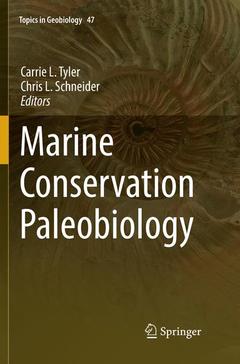Description
Marine Conservation Paleobiology, Softcover reprint of the original 1st ed. 2018
Topics in Geobiology Series, Vol. 47
Coordinators: Tyler Carrie L., Schneider Chris L.
Language: English
Subjects for Marine Conservation Paleobiology:
Marine Conservation Paleobiology
Publication date: 01-2019
261 p. · 15.5x23.5 cm · Paperback
Publication date: 01-2019
261 p. · 15.5x23.5 cm · Paperback
Marine Conservation Paleobiology
Publication date: 05-2018
Support: Print on demand
Publication date: 05-2018
Support: Print on demand
Description
/li>Contents
/li>Biography
/li>Comment
/li>
This volume describes and explores the emerging discipline of conservation paleobiology, and addresses challenges faced by established and young Conservation Paleobiologist's alike. In addition, this volume includes applied research highlighting how conservation paleobiology can be used to understand ecosystem response to perturbation in near and deep time. Across 10 chapters, the book aims to (1) explore the goals of conservation paleoecology as a science, (2) highlight how conservation paleoecology can be used to understand ecosystems? responses to crises, (3) provide case studies of applications to modern ecosystems, (4) develop novel applications of paleontological approaches to neontological data, and (5) present a range of ecosystem response and recovery through environmental crises, from high-resolution impacts on organism interactions to the broadest scale of responses of the entire marine biosphere to global change. The volume will be of interest to paleoecologists, paleobiologists, and conservation biologists.
An Overview of Conservation Paleobiology.- Should Conservation Paleobiologists Save the World on their Own Time?.- Conceptions of Long-Term Data among Marine Conservation Biologists and What Conservation Paleobiologists Need to Know.- Effectively Connecting Conservation Paleobiological Research to Environmental Management: Examples from Greater Everglades’ Restoration of Southwest Florida.- Using the Fossil Record to Establish a Baseline and Recommendations for Oyster Mitigation in the Mid-Atlantic U.S..- Coral Reefs in Crisis: The Reliability of Deep-Time Food Web Reconstructions as Analogs for the Present.- Exploring the Species-Area Relationship within a Paleontological Context, and the Implications for Modern Conservation Biology.- Refugia Past, Present, and Future: Lessons from Ancient Geologic Crises for Modern Marine Ecosystem Conservation.- Training Tomorrow’s Conservation Paleobiologists.- A Conceptual Map of Conservation Paleobiology: Visualizing a Discipline.
Dr. Carrie L. Tyler is an Assistant Professor at Miami University in Oxford Ohio in the Department of Geology and Environmental Earth Science. Her research interests include processes governing the distribution, paleoecology, and evolution of marine invertebrates.
Dr. Chris L. Schneider is an Adjunct Professor at the University of Alberta in the Department of Earth and Atmospheric Sciences. Her research interests include carbonate stratigraphy and marine invertebrate paleoecology.
Defines the goals of conservation paleobiology, and highlights how it can be used to identify and understand marine ecosystem crises Provides case studies demonstrating the applications of conservation paleobiology in modern communities Encourages interdisciplinary dialogue and collaboration to maintain a productive marine biosphere
© 2024 LAVOISIER S.A.S.




